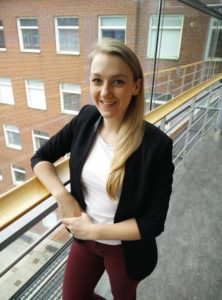
Photo: Anna Köhler
Anna Köhler, PhD student at the Department of Space, Earth and Environment, Energy Technology, is our current Vice-Chair of the DS Board. Her research focuses on the fluid dynamics in fluidized beds, addressing with both experimental work and modelling. Her work aims especially at a better usage of non-fossil fuels for example biomass in fluidized bed units, as there is still very little knowledge at hand and there is an important part of Sweden’s sustainable future. Recently we interviewed her and asked a few questions regarding her work at DS Board and life as a PhD Student. We have also asked how she handles stress and maintains a balance between her personal and professional life. Here comes the summary of the interview with Anna Köhler.
1. What motivated you to join the DS Board?
I wanted to know more about “how things work at Chalmers”. My all-time motivation is to improve – this applies to myself, but also to processes and structures I am affected of. When working in DS you get a lot of insights into Chalmers’ structure and have a chance to influence the rules and procedures we are involved in.
2. What do you think has been the most interesting and surprising aspect of being DS Boardie?
I like to work with and for other people. As a PhD student, you are often the only person responsible for your project. When starting as DS Boardie I realised how much I missed to work with others “of my kind”, meaning other students like we did in the Master programme. In DS you are surrounded by a bunch of motivated people, striving towards improving doctoral student life at Chalmers. This is very inspiring and fun.
3. What do you take back after being a DS Boardie?
Things might take much longer then you thought in the beginning, but it is always worth the effort to improve the conditions for the ones coming after you. There are a lot of people with great ideas at Chalmers – good if we make use of that to make Chalmers an even better-working place for PhD students.
4. What do you like to do when you are not researching?
I like to be outside. I spend a lot of time in the forest or by the coast, wherever you can go trail running, climbing or mountain biking. Gothenburg might not be famous for its weather, but its surrounded by beautiful nature with tons of great spots for recreation.
5. How do you handle stress at work (mainly from research)? Does it affect your personal life? How do you overcome this?
Stress is one of the biggest threats of our time. Especially in academia the stress level and its acceptance are high, which is an increasing problem. I think, most important to be able to handle stress is recreation – whatever this means to you. Sports? Being outside? Watch your favourite series? Meet friends? I try to actively plan in times to rest. When I have a period with the very high workload and a lot of extra hours spent at work, I take a day off afterwards or plan in holidays.
6. Do you think your time at DS board will help you to develop your skills (i.e. leadership skills) which will be helpful for your professional career? How?
Definitely! I meet a lot of people I can learn from. DS gives me valuable contacts and insights and I learn how to handle teams, negotiate and “make my point”. On the way, I’ve been able to improve my (written) Swedish.
7. What is the best advice/feedback you have received you think helped you a lot in your career/personal life?
A thing I see, which a lot of PhD students including myself are struggling with is our own expectations. Don’t compare yourself to others! It’s good to have high expectations, but sometimes it makes me feel like everybody is “doing better”… This is not true. When you talk to your fellow PhD students you will see, that we all have similar problems. It’s good to share experiences and support each other. We work with difficult and very complex problems, nobody solved before. Sometimes it needs a bit more patience to solve these kinds of tasks. As a PhD student at Chalmers, we are surrounded by great people and opportunities – it’s up to us to use them for our own asset.